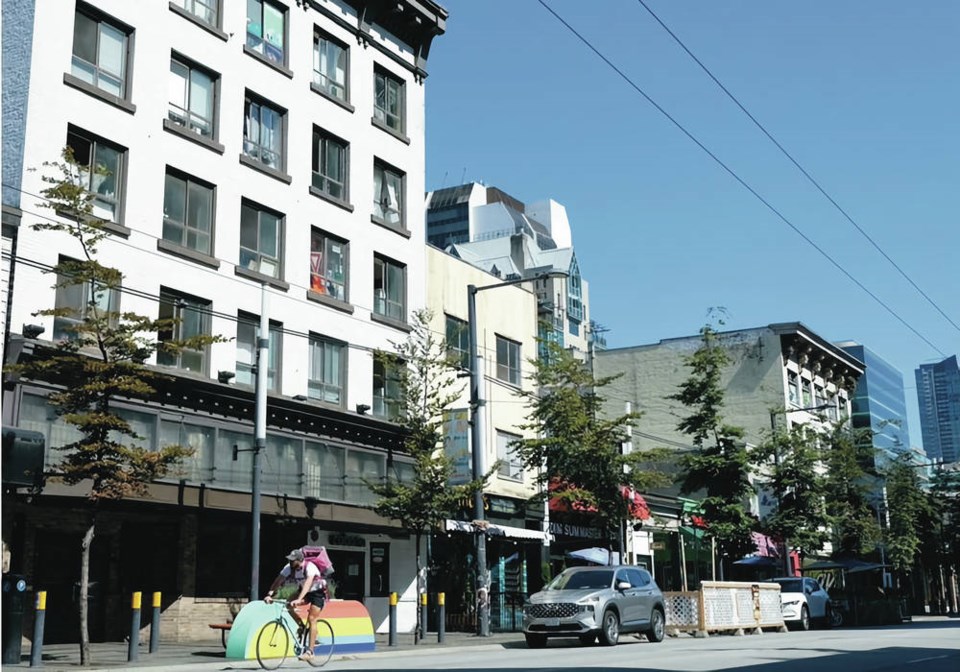VANCOUVER — A B.C. government-owned single-room-occupancy hotel on downtown Vancouver’s Granville Street strip has been hit with 80 orders to address issues related mainly to fire and health safety standards identified by city inspectors in June.
The 93-unit St. Helen’s Hotel at 1161 Granville St, which is home to some of the city’s most vulnerable citizens, had only three outstanding orders from October 2020 related to the fire bylaw before inspectors visited the six-storey building near Davie Street in June.
Of the 80 violations found in June, 46 were considered “life safety issues” mostly consisting of missing or defective smoke alarms and automatic door closers. Fire escape obstructions were also identified.
The other 34 violations related to electrical fixtures, outlets, doors, windows and plumbing fixtures in disrepair, along with holes in walls and ceilings and pest control issues, according to details on the city’s rental property standards database and information supplied to Glacier Media via email from Saul Schwebs, the city’s acting chief building official
“City inspectors will be returning to the building later this month to confirm issues identified in the annual inspection have been addressed,” Schwebs said. “Should these issues not be addressed, the city may issue further enforcement letters and/or refer the matter to the city prosecutor where charges may be laid.”
In November 2020, Vancouver Fire and Rescue Services levied a total of $2,000 in fines against the building’s owner for “failure to maintain adequate egress and missing/damaged fire exit signs” before the issues were addressed later the same month.
A property record search indicates the building is owned by the Provincial Rental Housing Corp., which is the holding company for B.C. Housing, the housing arm of the B.C. government.
In a statement emailed to Glacier Media, the housing agency said it continues to review and address any building-related concerns, noting the hotel was built in 1910 and requires frequent maintenance.
“Some concerns can be addressed immediately, for example, if someone leaves an item on a fire escape,” the agency said.
“Other concerns require more work to address, such as damage or wear-and-tear to units. Some common challenges are access to units, especially with challenges related to COVID-19, the frequency of repairs, given the age of the building, and when the city comes to inspect.”
B.C. Housing said the pandemic has affected building maintenance and repair across the province.
The agency noted entering suites to check for concerns or to make repairs “needed to be balanced with ensuring residents were able to safely isolate to stop the spread of the virus and the priority was placed on stopping the spread of the virus.”
“Now, as more British Columbians receive the COVID-19 vaccine, we can resume normal maintenance and repair efforts at St. Helen’s and elsewhere,” B.C. Housing said.
The hotel, which houses many people living with a mental illness, addiction, or both, and who would otherwise be living on the street, is managed by Atira Property Management, whose director of supportive housing is Jose Velazquez.
In an interview, Velazquez said the violations related to automatic door closers — which he and Schwebs said are crucial in preventing the spread of a fire from room to room — have recently been resolved.
But Velazquez said the door closers are often broken or dismantled by tenants for various reasons, and that it is an ongoing challenge for staff to keep devices operating throughout the hotel.
“Unfortunately, they break them or they disable them, or they do different things to them in order for them not to work,” he said. “The reasons for this are many. It could be related to mental health, it could be as simple as wanting more airflow in their rooms. We fix them, and then they get broken again.”
Smoke alarms also get disabled because some tenants smoke in their rooms, which is common in the city’s single-room-occupancy hotels and a reality that Velazquez said is challenging to monitor and control.
Janitorial staff will clean up the building during the day but garbage then piles up again after they leave at 4:30 p.m., he said.
Velazquez said the number of violations identified by city inspectors might be concerning to some citizens, but proper context needs to be highlighted in terms of the age of the building — as B.C. Housing noted in its statement — and tenants involved.
“It’s hard for people to have an accurate picture.”



